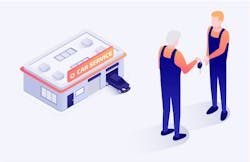Baby boomers are starting to head into retirement—an estimated 88.5 million Americans will be 65 or older by 2050, according to a government census report. That’s more than double its projected population of 40.2 million in 2010. According to a study from Nielson and Co., baby boomers that reach the age of 66 will increase by over 100,000 each year until 2030, while those who reach the age of 19 and enter the workforce will decline by more than 40,000 per year.
This means auto repair shop operators, too. From the Ratchet+Wrench Industry Survey, 26 percent of respondents said they will have or will be hitting retirement by 2040. And with the technician shortage, the industry will start to see an impact.
With all of these numbers in mind, Ratchet+Wrench breaks them down to help understand what this means for the auto repair industry, and what owners can do to stay ahead.
The Trends
To get some more insight, Ratchet+Wrench sat down with Joe Conner, a managing director for Harris Williams, which specializes in helping companies find the right partners to drive future growth of their business. With baby boomers getting ready to retire and the technician shortage on the rise, Conner says shops are going to have to start getting creative.
“With low unemployment, it is a challenge to find the right people, right talent, right laborers for your shop,” Conner says. “This only gets compounded if you have a huge chunk leaving the workforce.”
Conner says shops have started implementing training, apprenticeship, and onboarding programs for recruiting and retaining workers, and that the trend will continue.
On top of this, Conner sees consolidation on the rise for the entire automotive industry. And with the retirement surge, consolidators will have a lot more business opportunity.
“Take collision, general repair, quick lube, car wash. If you look at any of those sectors, there is consolidation going on in every one of them,” Conner says. “I think over time, yes, there will be less independent auto repair shops—you are seeing that now.”
The Options
With all of these numbers to consider, this leaves the question: What’s the best move if you’re planning to sell if you are retiring?
Conner says he sees three options:
- Sell the business to shop employees,
- Get an equity partner to take a stake in the business, become a consolidator from this, and then naturally transition over time until you are out of the business, or
- Sell to a competitor, or chain, who is out buying
When it comes to how to decide what the best decision is for your shop, Conner says the person to ask is yourself on what you are looking to accomplish in your business. If an owner is concerned about his or her employees having jobs and making sure the place doesn’t get shut down, maybe selling to your team or a private buyer is the way to go. Or if the owner believes he or she has built something valuable and is looking to maximize the price like any other investment, the biggest offer will get his or her attention.
For shop owners Steve Mancinelli and Dustin Brown, they weighed the pros and cons of their options as they plan for retirement.
Mancinelli’s Auto Repair Center, located in Denver, has been in Steve Mancinelli's family since 1950, where he grew up working in the shop and finally took over in 1985 at the age of 23. Now, almost 35 years later, he is planning to officially retire at the end of 2020.
Brown is newer to the game. Located in the Albuquerque, N.M., area, he took over the family business two years ago. Before he retires, he wants to take his three locations to five, which is when he plans to pass the torch on to someone—or something—else.
Mancinelli is considering selling to a private buyer, while Brown wants to join the consolidation game.
When it comes to selling his business, Mancinelli already has interested private buyers, specifically, buyers that he knows will take care of the place and the workers there when he’s gone.
“A private buyer will only make a decision about the purchase based on the type of business it is and whether the operation fits with his or her standards and values,” Mancinelli says. “Consolidators are, in essence, bean counters, and the more they acquire, the lower their standards and quality are as a general rule.”
Brown’s main concern is selling the shop for what it’s worth. Some private buyers will wheel and deal, trying to get the lowest price possible. And this doesn’t include the time it will take to find the right buyer that you can trust, which may lead to lowering your asking price. Along with trying to compete with chains, Brown says he thinks selling to a consolidator would be the easiest transition; they’d purchase all of the shops at once, saving time and getting the best bang for your buck.
“The industry is going to move toward bigger buyers,” Brown says. “Larger companies are going to have better buying power to purchase all of the stores at one time.”
The Industry Impact
Even with Conner seeing an upward consolidation trend, he says independents will always be around; it will just be a slow, upward movement over the next decade. But with that in mind, he says if you can’t beat ‘em, join ‘em.
“Regardless of the service market, it’s not like there are two or three consolidators and there isn’t room for more,” Conner says. “If you are an independent wanting to grow your business, find a partner to go into consolidating your own business.”
Overall, he says if you have a good business and know how to operate it, you can become your own consolidator with the right partner and the right resources.

